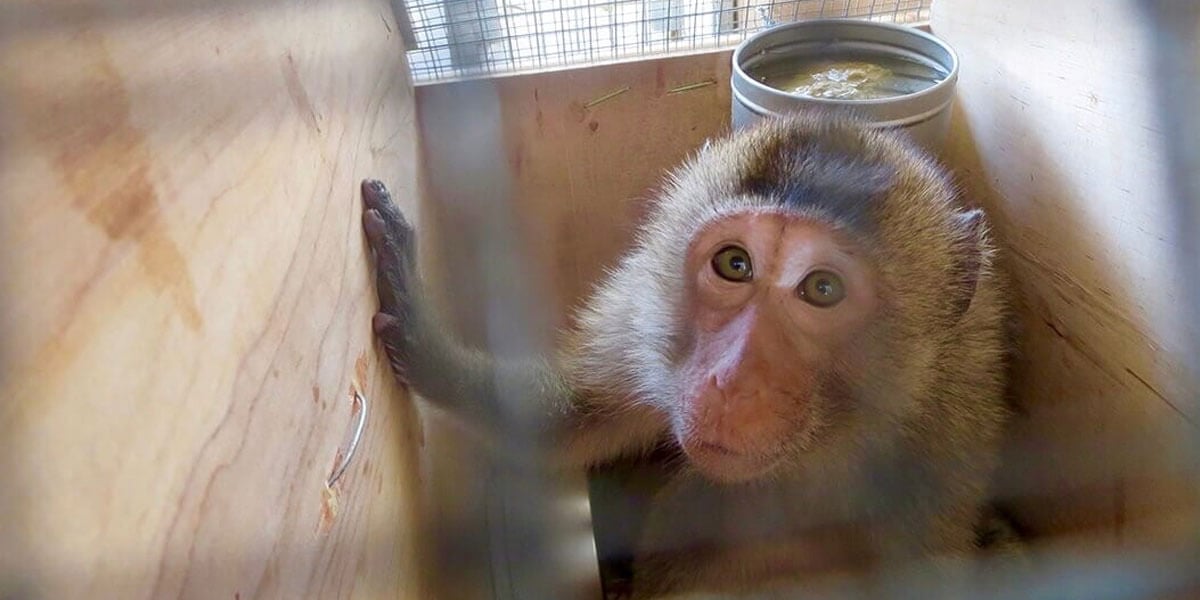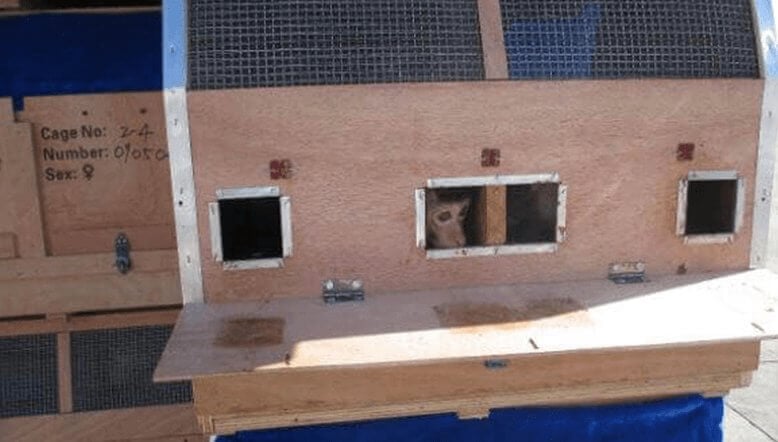PETA Exposé: The CDC Risks Epidemic by Letting Diseased Monkeys Into the U.S.
Update (February 27, 2023): The U.S. Centers for Disease Control and Prevention (CDC) has gotten off its backside and now, finally, requires quarantine facilities for newly imported monkeys to report symptoms of potentially deadly disease.
The move follows PETA’s exposé revealing that the CDC previously allowed laboratory-bound monkeys to enter the U.S. infected with deadly pathogens, exhibiting symptoms that included diarrhea, fevers, hemorrhaging, abscesses, weight loss, and vomiting.
These monkeys, many of whom are abducted from their forest homes around the world, can carry pathogens and diseases easily transmitted to humans, including Ebola-like viruses, tuberculosis, salmonella, and a bacteria so deadly that it has been classified as a potential bioterrorism weapon.
The agency also now requires mandatory treatment for any monkey entering the country infected with malaria. It’s the first time the CDC has even acknowledged that imported monkeys may harbor malaria parasites that could easily be transmitted to humans, if mosquitoes feed on the monkeys and then on humans.
We welcome the CDC’s admission that the importation of primates for use in junk-science experiments threatens public health, even if it is late to the party. However, the only way to eradicate the risk is to stop importing monkeys entirely.
That’s just been made abundantly clear with a troubling assessment from the U.S. Department of Energy that the COVID-19 pandemic was begun by a laboratory leak. The next lab leak and pandemic are just one shipment of monkeys away. But the CDC has refused to stop this deadly trade, despite the threat to humans and the decimation of wild monkey populations. If the U.S. recklessly continues down this path, it won’t be a question of if the next lab leak will occur but rather of when.
Please take action to help ensure that this scenario doesn’t happen.
Originally published on December 19, 2022, by Keith Brown. Last updated on January 26, 2023.
NBC News reporter Stephanie Gosk just took viewers into the dark underworld of the nasty international trade in monkey flesh, which nets big money for sellers and new victims for U.S. laboratories. Don’t miss seeing PETA primate scientist Dr. Lisa Jones-Engel make the ethical and scientific case for shutting down this despicable pipeline.
But there’s more to the story—and it could threaten your life.

As reported by The Guardian, PETA recently obtained damning information revealing that the Centers for Disease Control and Prevention (CDC) has known that a host of nasty bacteria, including one classified as a bioterrorism agent, regularly enter the U.S. in shipments of monkeys imported for laboratory experiments and that the agency hasn’t bothered to notify the public.
In July, the CDC alerted officials in the Mississippi Delta region to the presence of a bioterrorism agent, a type of bacteria that causes the disease melioidosis, in the soil and water. Melioidosis is associated with a potentially lethal respiratory disease that can kill 10% to 50% of those infected. Yet CDC officials said publicly that the agency had no idea how the bacteria got there, even though it clearly understood that shipments of monkeys were one possible source.
Because of this deception, PETA wrote to CDC officials, demanding that the agency stop playing with fire and immediately ban the importation of all monkeys destined for laboratories across the country in order to eliminate this potential source of the next pandemic.
According to the CDC’s own documents, the agency knew this bacteria was infecting monkeys in Southeast Asia and being carried into U.S. facilities, most recently in 2021.
The bacteria was detected in sick monkeys at Tulane National Primate Research Center in Louisiana in 2015. But the CDC blamed staff error, not imported macaques, even though two years earlier, an imported monkey had brought that same bioterrorism agent into the CDC’s own monkey colony.
On top of the evidence PETA uncovered, a case report just published by individuals working at the CDC, the Texas Department of State Health Services, and monkey-importer Inotiv’s primate quarantine facility in Texas revealed that during 2022, at least four monkeys imported from Cambodia into Texas were released from quarantine labs despite being infected and likely shedding this deadly pathogen. At least six monkeys imported into the U.S. in 2020 and 2021 have been infected with the bacterium.
Documents also show that the CDC knew that imported monkeys carry tuberculosis and other easily transmitted unnamed viruses that cause diarrhea so violent that it sheds the lining of the gut.
The CDC never bothered to make a public announcement about the inherent dangers of these viruses, which have the potential to spark a new pandemic.

The agency’s own documents make it glaringly obvious that many of the 100,000 monkeys imported during the COVID-19 pandemic have been moved throughout the U.S., carrying dangerous diseases that can cause severe illness and even death in humans. It’s like playing with matches in a lighter fluid factory.
Coupled with the devastation of wild macaque populations and the zoonotic-disease threat that imported and/or domestic colonies of primates pose to humans, it’s time the CDC did the responsible thing.
What You Can Do
The CDC could shut down all importation of monkeys today, but it chooses instead to keep supporting this violent industry steeped in pain and continues to endanger human health.
Please join more than 45,000 PETA supporters and demand that the CDC end monkey importation immediately.

